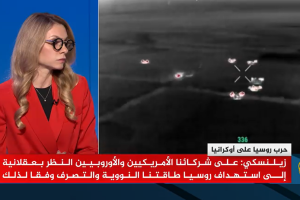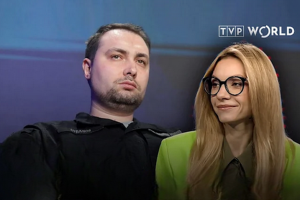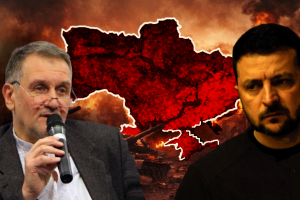Ban on the Russian internet resources in Ukraine: sensational initiative with a far-reaching political impact
Ruslan Kermach Political analyst, Democratic Initiatives Foundation | Last week President of Ukraine Petro Poroshenko signed a decree putting into effect the decision of the National Security and Defense Council of Ukraine “On the Application of Personal Special Economic and Other Restrictive Measures (Sanctions)”. The document envisages the imposing of sanctions on 1,228 physical entities and 468 legal entities among which this time are a number of Russian Internet companies (Yandex, Ltd., Mail.ru), developers of anti-virus programs and software (Kaspersky Lab, Dr. Web and 1C) and popular social networks “Vkontakte” and “Odnoklassniki”. According to the approved decision Internet providers must ban access to corresponding Internet resources from one to three years. |
Non-democratic decision with dubious legality
The official ban on access to a number of popular Internet resources and services in Ukraine caused a major stir in Ukrainian society and the expert environment, which notably differentiates this situation on the backdrop of previous stage of sanctions, which were imposed on Russian companies in the past (Aeroflot, TASS information agency, RIA “Novosti”, NTV television company, “Russia 24”, etc.).
The sharp reaction of Ukrainian citizens to the new bans in the Internet space is not strange if to factor in the number of regular users of the aforementioned Internet resources on the renewed sanction list. According to expert assessments, the social networks “Vkontakte” and “Odnoklassniki” had a multi-million audience of regular users in Ukraine, while “Yandex” covered almost a third of Ukrainian search traffic. The president’s decision, therefore, directly affects the interests and infringes the rights of millions of Ukrainian citizens, who used the services of the respective internet platforms. Particularly notable in this context is that the approval of this contradictory decision of the president was not preceded by civil or expert discussions of the potential problems for users or the agreement of measures to minimize such problems. As it was clarified, for many Ukrainian citizens the loss of access to the respective Russian Internet platforms or services creates not only additional unforeseen inconveniences, but is associated with financial losses, which the state is not likely to compensate. Engaging citizens and experts to a broad discussion on information security and protection of information space could have contributed to the development of a more balanced policy.
Alongside this certain expert lawyers are today justly expressing their doubts as to the legality of the approval of this decision regarding the ban on access to certain Internet sites by way of the president signing the respective decree, rather than by the corresponding judicial procedures. Article 10 of the Law of Ukraine “On the National Security and Defense Council of Ukraine” envisages that “the fulfillment of decisions of the NSDC of Ukraine put into effect by decrees of the President of Ukraine is binding on the bodies of executive power”. Therefore, the presidential decree can be sufficient grounds for limiting access to certain Internet resources first and foremost for state structures, but not for private Internet providers and users.
So, even if to leave aside discussions of arguments “in favor” or “against” the president’s decision on banning access to a number of popular Internet resources, there are fairly weighty grounds to cast doubt on the legality of such a decision and its correspondence to democratic approaches to devising similar decisions that in addition to that affect the interests of many Ukrainian citizens.
Public opinion split and the dubious practical expediency of the president’s decision
The decision on limiting access to a number of Russian Internet resources and popular social networks divided Ukrainian citizens conditionally into two main camps: those who make an accent on the notable limitations of freedom of citizens, in particular, in the part about free access to information and communications in the Internet space in light of the recent decision approved by the president and those citizens who justify the corresponding initiative taking into consideration national security and interests of the country in the information space.
Representatives of the camp of opponents to the decision on banning Russian Internet resources in Ukraine feel that such bans are not only an unjustified limitation of the fundamental rights of citizens for the freedom of speech and access to information, but they also create dangerous precedents for the possible application of further measures that limit the freedom of citizens in Ukraine.
In return, proponents of the president’s initiative point to the fact that Internet resources controlled by Russian special services (in particular, the FSS) could be platforms for dissemination of false information (fakes) and propaganda and can be used in information special operations of aggressor country. In light of this, the key motivation of limiting access to Russian Internet resources is considered the protection of citizens from the negative influence of Russia through the resources under its control.
Indeed, fully excluding the possibility of the effective use of Russian Internet platforms in the informational opposition with Ukraine is impossible. Moreover, today there are enough examples of domestic and foreign experience that point to the conscious work of the Russian special services on a diversity of information-communication platforms, including social networks, to promote their goals.
However, the majority of leading experts in the IT sphere equivocally note that the decision approved by the president is ineffective from the vantage point of resolving the official task of the protection of the country’s information space. There is a vast number of methods for effectively overcoming artificially set limitations in the Internet space (VPN, proxy-servers, etc.), which are successfully used in many countries with similar limitations and bans in the Internet space. Accordingly, this means that those who are willing to continue using banned Internet resources in Ukraine will most likely not face any serious problems.
For the creation of serious mechanisms of limiting access and tracing users of banned sites according to expert assessment huge sums of money are needed to purchase the corresponding equipment and systems, which, however, also do not guarantee absolute protection. Judging from the previous statements of representatives of the ruling power in Ukraine once can draw the conclusion that there are no intentions of introducing such mechanisms and attempts at tracing the use of blocked Internet sites by citizens. As such, this begs the totally logical question about the overall expediency of the president knowingly imposing ineffective limitations in the Internet space at the official level of a state decision.
“Unofficial” motives of an official decision on sanctions in the Internet space
In truth, the decision on limitations for a number of Russian Internet companies approved by the president from the very start could have been thought up not so much as practical, as a symbolic step of the ruling power through which the latter outlines its state policy on this issue and sends out a signal to citizens who are not indifferent about danger or inappropriateness, in their opinion, of the use of the corresponding Russian Internet resources and services. In the more long-term future such an approach could potentially justify itself and lead to a gradual decrease in the audience of Russian Internet sites and social networks in Ukraine.
However, counting the potential political gains for the president from the approved decision is quite difficult. Most likely this initiative could be positively perceived by the patriotically oriented segment of Ukrainian citizens, who are in favor of maximum limitation of connections with the neighboring country (Russia), particularly in the information and cyber space. At the same time, many current active users of the Internet most likely do not approve of the president’s decision, though the probability of an active protest or counteraction on their part in response to the ban seems fairly low in light of their capacity to easily circumvent the set limitations to access to banned sites. In any case, the multi-million large audience of banned Internet resources could perceive the ban as a direct threat to their own rights and freedoms and in the future supplement the ranks of the electorate opposed to the current ruling political elite.
At the same time, it cannot be ruled out that in conditions of the genuine incapacity (for the aforementioned technical reasons) to introduce effective limitations on access to Russian Internet resources the president and the upper echelon of the state leadership of Ukraine risks discrediting itself even among the potential proponents of the corresponding initiative on the ban as incapable of effectively implementing its own decision.
The effect of imposing additional sanctions as an additional financial burden for the Russian IT business due to the loss of the Ukrainian market is at the moment fairly complicated to calculate, although it seems logical consequence of such sanctions. However, there are no doubts about internal unforeseen losses and complications in light of the corresponding limitations of Ukrainian consumers and companies.
Reaction of the international community and potential risks
In the context of the recently approved decision of the president (banning of a number of Russian Internet resources) Ukraine clearly may also suffer damage to its reputation and image at the international level. Moreover, the potential consequences for the country from this may be even more tangible than the internal effect of introduction of limitations in the Internet space at the official level.
The decision of President Poroshenko on the ban of Russian Internet resources and social networks in Ukraine found “limited approval” of the EU, where together with this it expected from official Kyiv a detailed explanation of “in particular the temporary nature of the sanctions”. At the same time, the resounding decision was highly criticized and condemned by the Secretary General of the Council of Europe and a number of international human rights watchdog organizations, among which are “Reporters without Borders” and “Human Rights Watch”. The latter are calling on President Poroshenko to cancel the ban and point to the fact that similar broad limitations (bans) regarding resources with a large audience “do not comply with the principle of proportionality” and contradict the principles of the International Covenant on Civil and Political Rights and the European Convention on Human Rights, of which Ukraine is a signatory.
It is not worth ruling out that as a result of the approved decision on the ban of Russian Internet resources Ukraine’s position could notably worsen based on the results of this year’s ratings of freedom of the Internet of the authoritative international organization Freedom House, which may also pose a threat to the country creeping into the status of “non-free countries” (since 2014 Freedom House has classified Ukraine as “partly free” country). As it is known, the introduction of the ban by President Poroshenko basically puts Ukraine on the same tier with authoritarian states, such as Russia, Iran, North Korea and China, where limitation of the freedom of access to information in the Internet is also practiced. So, it is quite obvious that far-reaching transformations of the international image and perception of Ukraine as not free enough country could have a highly negative impact on the support of democratic transformations in the country on the part of western partners of official Kyiv.
In conclusion, the decision of the president on the ban of a number of Internet resources that are popular in Ukraine clearly has fairly doubtful practical (technical) expediency and, as it has become clear, does not resolve the officially announced task of protection of the information space of Ukraine, which gives grounds however to notice the presence of certain unofficial motives of a political nature in the context of approval of the aforementioned sensational decision. Together with this the first reaction on the international arena to the initiative of President Poroshenko generally gives grounds to speak of possible irreparable damages to Ukraine’s reputation from this decision as one which puts Ukraine on the same level as authoritarian countries where similar limitations of the Internet are practiced. Meanwhile, the absence of due communication of the ruling power with citizens regarding the plans of introducing limitations, which affect that interests of many millions of Ukrainian citizens, could serve only as routine testimony to the preservation in Ukraine of disastrous non-democratic practices of the approval of political decisions without taking into account the interests of key stakeholders.









